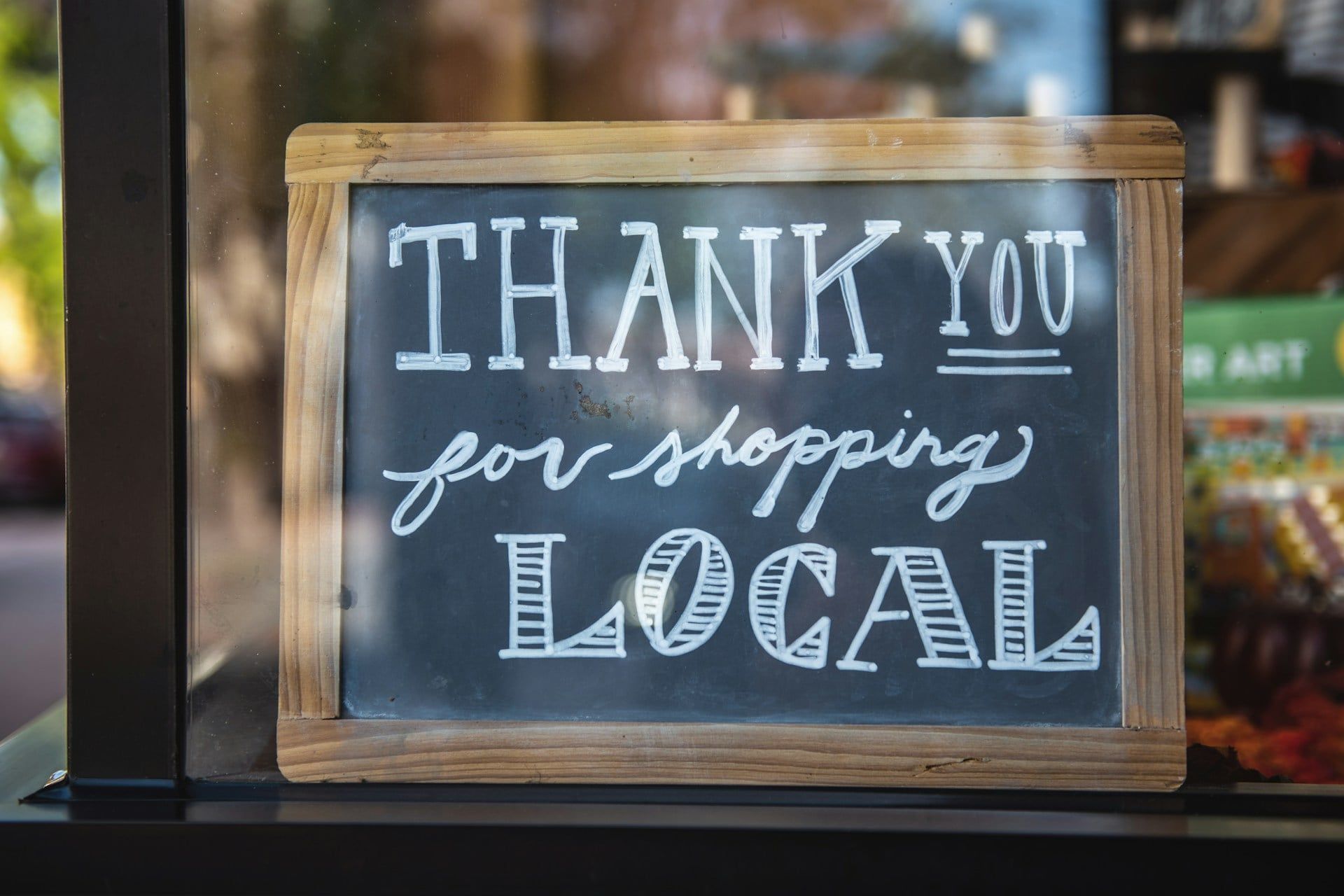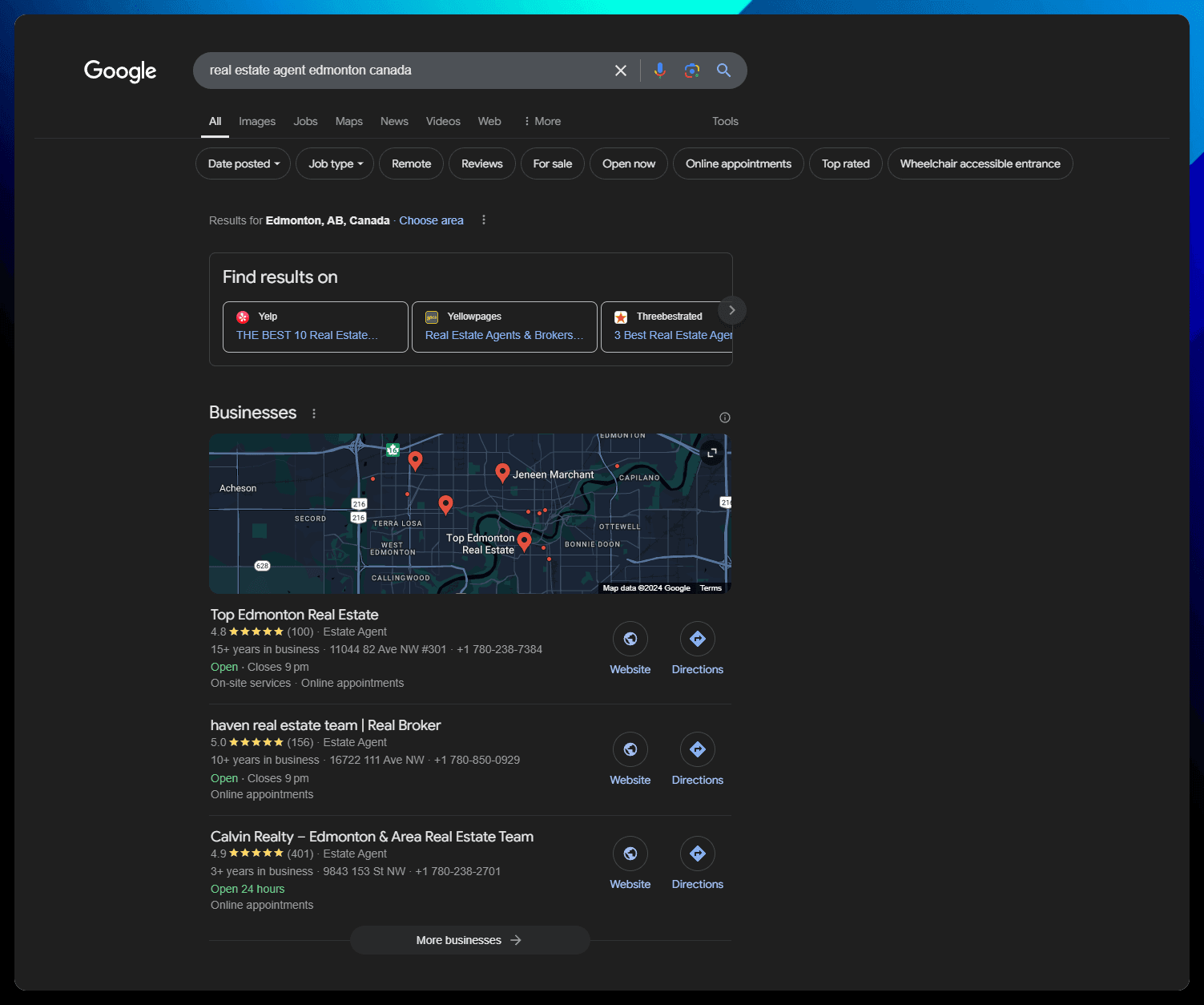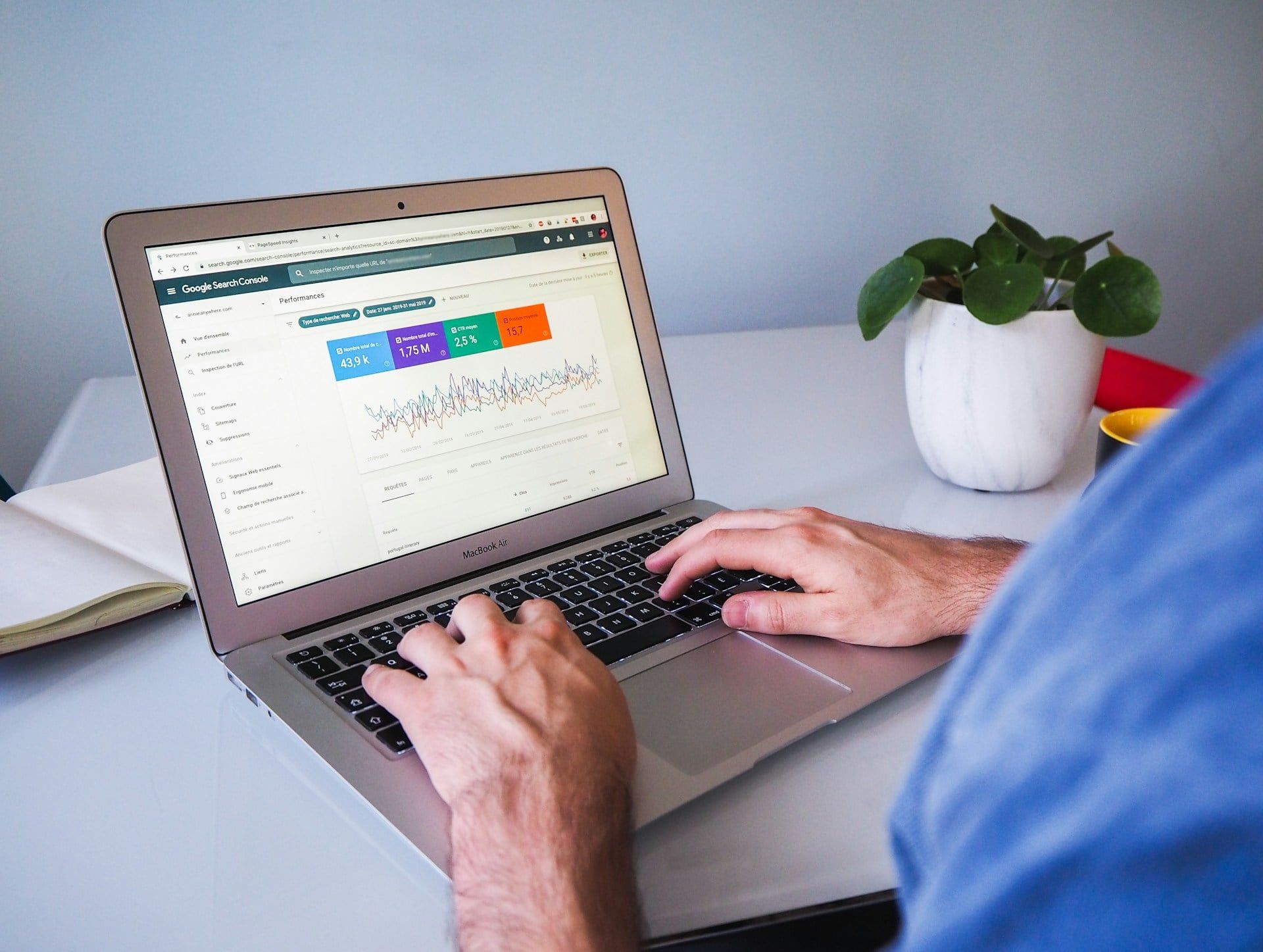Why Local SEO is Critical for Edmonton Businesses in 2024
by Aaron Janes, Founder
If your a business owner, and you want to learn the same strategies that I use to grow my business and my clients, then sign up for my newsletter.

Ever searched for something like "best coffee shop near me" or "plumber in southwest Edmonton" on your phone?
Of course, you have. We all have. It's practically the way of operating in the modern world.
In fact, a whopping 46% of all Google searches are people looking for something local. Whatever comes up in life, people are searching and looking for the services and products in their area to help get things done.
But here's the thing: if your business isn't showing up in those search results, you're missing out on a huge chunk of potential customers – and that's where local SEO comes in.
The art of optimizing your website, content, and Google presence to rank in the top ten results in your local area. Ensuring you pop up when Edmontonians search for products or services like yours.
It's no longer a "nice-to-have" – in 2024, it's absolutely critical for any business in our city that wants to thrive.
So, what does this mean you need to do for your business? In this guide, I'm breaking down all you need to know about why local SEO is important, the key strategies needed to succeed, and how to get your rankings going upwards.
In this post, we'll break down why local SEO is so important for Edmonton businesses, what the strategies to success are, and everything else you need to know to win.
Let's dive in.
Edmonton: A Unique Market

Edmonton isn't just any city; it's a dynamic hub with a distinct personality.
We're not just talking about the Oilers and festivals (though those are awesome!). Did you know that Edmonton is one of the fastest-growing cities in Canada? Yep, people are flocking here, bringing with them a wave of diverse cultures, interests, and needs.
While this is amazing from a city standpoint, it also means that the business landscape is becoming increasingly competitive.
Whether you're running a trendy café in Old Strathcona, a construction company in the southwest, or an online boutique shipping across the city, you're facing a growing crowd of businesses vying for the attention of Edmonton consumers.
And guess what? Those consumers are increasingly turning to online searches to find what they need.
Think about it – when was the last time you looked for a restaurant, a dentist, or a new hair salon without Googling it first? When did you last commit to using the first business you found without checking the website or reviews?
Exactly.
That's why it's more important than ever for Edmonton businesses to have a strong online presence and connect with their target audience right here in our city.
Why Local SEO Matters (More Than You Think!)
So, local SEO, what's this all about?
Well, as mentioned above, everyone uses Google to search for everything these days, which means as a business, you need to get onto Google and ranking as high as possible. This means if you're a dental service, you rank in the top results when someone searches "dental services Edmonton".
How you do this is through the art of local SEO.
Think of Google as a super-smart matchmaker.
When someone searches for "best Italian restaurant near me," Google wants to connect them with the most relevant and best-rated options nearby.
By referencing its constantly updated index, Google uses all kinds of reference points to match the best website to the user's search intent. Reference points like:
- The words on your website (keywords)
- The user experience offered, including how fast the pages load, how good the website looks on a mobile device, the quality of your images and graphics and so on.
- The value of your content
- The quality of your technical SEO
- How many high-authority websites point to your website
- How many reviews your business has
- How many people come to your website, and how long do they stay on the pages
And so much more.
At the end of the day, Google is the top search engine because they're really good at giving their users the best experience. And their users are also your customers, so give your customers what they're looking for, and you're giving Google a great option to put at number one for your search terms.
Thus, they'll put you there.
But setting all this up is the work you need to do through your local SEO efforts.
The Local SEO Toolkit: Your Weapons of Choice

So, let's get to work, starting with the toolkit that will enable you to optimize your local SEO properly. No surprise here, but Google offers the tools to help you get it right. Let's explore the essentials:
Google Business Profile (GBP)
If you haven't claimed and verified your Google Business Profile yet, drop everything and do it now. Seriously, it's that important. Your GBP is your chance to get at the top of the SERPs (search engine results page) when it comes to local searching.

If you don't have your account set up and optimized, then it's impossible to be in this location. This is crucial because it's the first thing people see when they search for you on Google.
And again, this means setting up and optimizing. Here's how to make it shine:
- Complete every section: Don't leave any blanks! Fill in your business name, address, phone number, website, hours of operation, categories, and anything else that's relevant.
- Craft a killer description: Use this space to tell your brand story and highlight what makes your business unique. Don't forget to sprinkle in some relevant keywords!
- Showcase your best side: Upload high-quality photos of your business, products, and services. Think inviting, professional, and eye-catching.
- Embrace the power of reviews: Encourage happy customers to leave reviews on your GBP. Respond to all reviews, good and bad, to show you're engaged and care about your customers.
- Keep it fresh: Regularly post updates, special offers, and events on your GBP to keep your profile active and engaging.
Website Optimization
Your website is your online home, so make sure it's welcoming to both visitors and search engines.
- On-page optimization:
- Keywords are key: Use relevant local keywords throughout your website content, but don't overdo it. Keep it natural and focus on what your customers are actually searching for.
- Structured data markup: This is a fancy way of saying "speak Google's language." Use schema markup to help search engines understand your business information, like your address, phone number, and hours.
- Mobile-first: Most local searches happen on mobile devices, so ensure your website is responsive and looks great on all screen sizes.
- Off-page optimization:
- Citations, citations, citations: Get your business listed on relevant online directories and platforms, like Yelp, 411.ca, and industry-specific directories. Make sure your business name, address, and phone number (NAP) are consistent across all listings.
- Backlinks are like votes of confidence: Earn links from other reputable websites, especially local ones. This shows Google that your business is trustworthy and relevant to the Edmonton community.
Content Marketing: Your Storytelling Platform
Content is king, especially when it comes to local SEO. Create valuable and engaging content that resonates with your Edmonton audience.
- Think local, act local: Write blog posts about local events, community initiatives, or news relevant to your industry.
- Showcase your local expertise: Offer tips, advice, or insights related to your products or services specific to Edmonton.
- Collaborate with local influencers: Partner with local bloggers, social media personalities, or businesses to create content that reaches a wider audience.
Local SEO: Not One-Size-Fits-All
Just like every business in Edmonton is unique, so should your local SEO strategy be. What works for a Whyte Avenue boutique might not be the best approach for a Sherwood Park plumbing service. Let's break it down:
- Brick-and-mortar stores: For businesses with a physical location, like that trendy Whyte Ave boutique, visibility on Google Maps is key. Focus on:
- Optimizing your Google Business Profile: Make sure your address, hours, and photos are accurate and enticing.
- Building local citations: Get listed on relevant directories and platforms.
- Encouraging customer reviews: Positive reviews can significantly boost your local ranking.
- Running local promotions: Offer specials or events to attract foot traffic.
- Service-area businesses: If you're a plumber, electrician, or dog walker serving specific areas in Edmonton, you need to optimize for those service areas.
- Specify your service areas in your Google Business Profile.
- Create location-specific pages on your website: For example, a page for "plumbing services in Sherwood Park" or "electricians in southwest Edmonton."
- Target location-based keywords in your content: Use phrases like "plumber near me in Mill Woods" or "best dog walker in Riverbend."
- E-commerce businesses: Even if you don't have a physical store, you can still attract local customers online.
- Use local keywords in your website content and product descriptions.
- Offer local delivery or pick-up options.
- Highlight customer testimonials from Edmonton residents.
- Run targeted online ads for the Edmonton area.
By tailoring your local SEO strategy to your specific business type, you can effectively reach your target audience and achieve your business goals.
Is it Working? Keeping Tabs on Your Local SEO Success

You've put in the work, optimized your website, claimed your Google Business Profile, and maybe even started a blog by creating high quality content. But how do you know if it's actually making a difference?
It's time to track and measure your results.
Like any sport, you wouldn't just skate around aimlessly without keeping score, right? You need to know if you're scoring goals (or, in this case, gaining customers!).
Here are some key performance indicators (KPIs) to keep an eye on:
- Website traffic: Are you seeing an increase in visitors to your website from local searches? Google Analytics can help you track this.
- Google Business Profile insights: Your GBP dashboard provides valuable data on how people are finding and interacting with your profile. Pay attention to views, clicks, calls, and direction requests.
- Keyword rankings: Are you ranking higher for relevant local search terms? Use SEO tools to monitor your keyword positions.
- Conversion rates: Are those website visitors turning into paying customers? Track your conversion rates to see how effectively your local SEO efforts are driving sales.
- Customer acquisition cost: How much does it cost you to acquire a new customer through local SEO? By tracking this metric, you can assess the return on your investment.